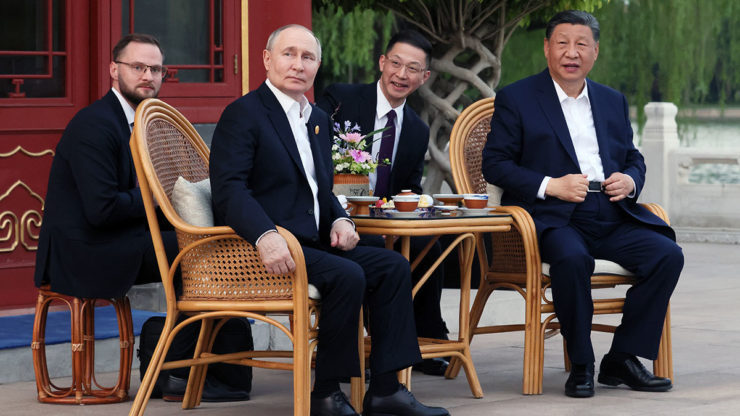
On May 17th President Putin concluded his two-day visit to China. This was his first international visit after he was elected the Russian President for the fifth time. President Putin’s decision to China soon after his re-election defined multiple unfolding geopolitical and geostrategic realities of the world. Currently, Russia and China pose the biggest threat to the contemporary US-led Western World Order. Strengthening the alliance between them is the worst nightmare of the Western powers. Russia and China hold paramount significance for each other in the shifting global paradigms. Leaders of both countries have demonstrated their realization of the other side’s significance through their actions. Russia was the first country that Chinese President Xi Jinping visited last year after his re-election. President Putin has also returned the favor by doing the same. Moreover, the significance of both countries for each other could be understood by the fact that the two leaders met each other 40 times in the last 10 years.
US sanctions against Russia, China, and some other countries divergent in their ideology and decisions have cemented the ties between these nations. Chinese support for Russia in the latter’s conflict with Ukraine has further enhanced their relationship. Russia and China are pursuing a new world order. Both nations are following an inclusive world order which allows the Third World countries to follow their foreign policies independently. BRICS expansion has bolstered their rise and influence over the middle powers and the Third World countries. President Putin’s visit to China was an important step to bolster ties between the two countries. The joint statement at the end of the visit reaffirmed their bilateral strategic ties and their ambition to counter all the hostile and destructive pressure from the United States. Moreover, the joint statement also mentioned plans to increase military cooperation. It also mentioned how the bilateral cooperation in the defense sector helped to improve regional and global security.
Another significant aspect of this joint statement was that it criticized the United States for its nefarious regional and global designs. It stated that the Cold War mentality is still the guiding principle among the US policymakers, which makes them the logic of bloc confrontation. Moreover, it also chastised the United States for prioritizing the security of “narrow groups” over regional stability and security. The US sanctions were also criticized in this joint statement issued at the end of President Putin’s visit to China. The United States criticized this joint statement and the increasing cooperation between the two sides. Another captivating aspect of this joint statement was that it emphasized that both countries seek a political solution to the Russia-Ukraine conflict. Russia has been seeking a political solution to the conflict for a long time. Limited advances of the Russian army despite their obvious military supremacy over the Ukrainian forces demonstrate Russia’s will for peace. However, the United States and its NATO allies sabotaged all the previous efforts for a peaceful and diplomatic resolution of the issue due to their geopolitical and geostrategic interests. President Putin also gave a briefing to his Chinese counterpart about the advances of the Russian forces in Ukraine.
In a news briefing, the US State Department’s secretary spokesperson, Vedant Patel, criticized China for engaging with Russia. He also held that China’s role in reconstituting the defense industrial base of Russia was “deeply problematic.” Chinese President Xi Jinping recently visited Europe. His visit sparked fear among the US officials. Many US analysts and officials termed this visit as a tool for exploiting increasing disunity among the European nations. The United States is anxious about Xi’s surging influence among the European states. Therefore, his visit to Europe followed persistent warnings from the US to the European countries about the potential repercussions of China’s support of Russia against Ukraine. China’s decision to bolster its relations with Russia despite the West’s warnings and threat of economic sanctions portends that it is ready to face every threat to establish an inclusive and true “liberal world order” where all the nations are provided equal opportunities.
The inclusive and constructive policies of the two neighbors have garnered significant attention and appreciation from third-world countries. While the US is still busy exhibiting its military might and hard power through economic sanctions, Russia and China are using their soft power to increase their influence over developing and underdeveloped countries. Both countries are playing a pivotal role in stabilizing chaotic regions like the Middle East, Africa, and Afghanistan. President Putin has gained popularity among the Muslim world for his stance against blasphemy and his respect for other religions. Surging ties and cooperation between Russia and China are seminal for accelerating the decline of US hegemony over the world. Currently, most of the third-world countries look towards Russia and China as they hold a promising potential to establish a rule-based and just world order. The upcoming BRICS summit in Russia is perceived to further enhance their bilateral ties along with increasing their influence over the world.
Abbas Hashemite – is a political observer and research analyst for regional and global geopolitical issues. He is currently working as an independent researcher and journalist, exclusively for “New Eastern Outlook”.
